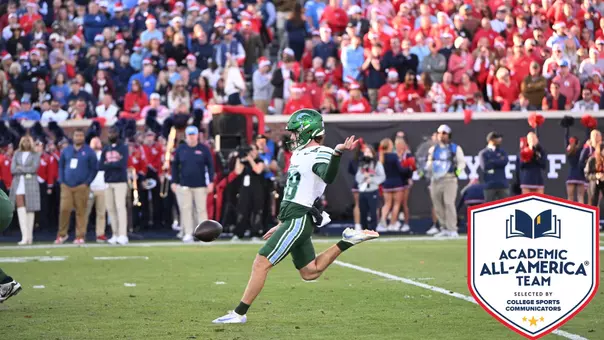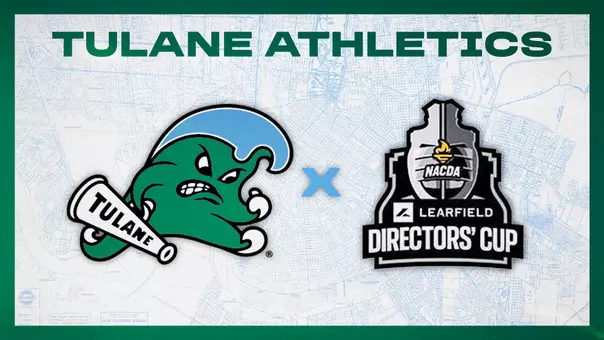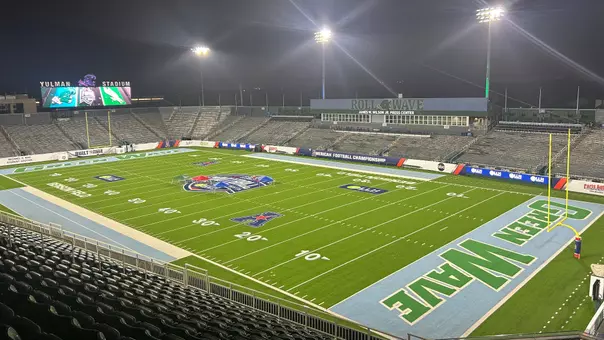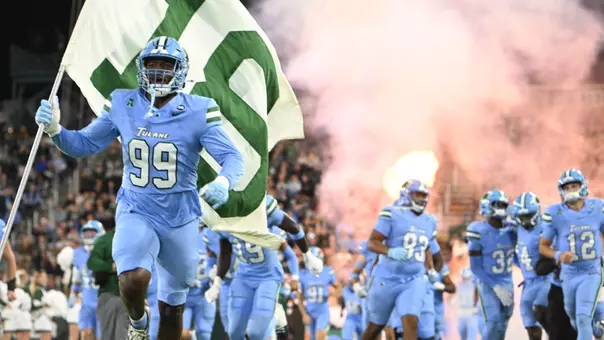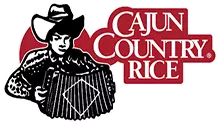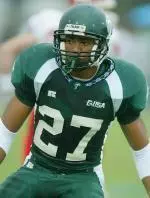
Out Of The Shadows
Dec 9, 2004 | Football
Dec. 9, 2004
NEW ORLEANS, La. - Following in an older sibling's footsteps is always tough, especially when the older brother or sister has a legendary reputation. Expectations on the younger sibling are often set high.
From 1996 to 1999 the Green Wave's offense was led, in large part, by JaJuan Dawson, one of the most dynamic receivers in the program's history. He set school records for most receptions in a game (16 catches vs. SMU in 1999) and in a season (96 in 1999), most consecutive 100-yard games (1999), most catches per game in a season and in a career, and most career touchdown catches (31).
Closely watching JaJuan from the stands during those years was his younger brother, Joey, who was making his own plans to one day become a college football player.
The younger Dawson learned the game of football in his hometown of Gibson, La., just outside of Houma, an hour southwest of New Orleans. Family and friends would set up games in the backyard, which would occupy the children's time in the otherwise quiet town.
"With Gibson being such a small town, I didn't hear much about colleges until I was a little older. The first time I heard of Tulane is when my brother was recruited. We're not exposed to too much down there," Dawson said, laughing. "Between Houma and Thibodaux, New Orleans was like a vacation."
Dawson played Little League football at age 12, then made the junior high school squad. At H.L. Bourgeois High School, however, Dawson had trouble earning a place on the varsity team.
"My freshman year of high school, I tried out for the team and got cut before I even put on my pads," Dawson said. "I was a really scrawny kid then, and not that fast. Even my senior year I only weighed 165 pounds."
Cut from the football team, Dawson turned his attention to basketball and track and field before trying out for the junior varsity football team in his junior year. This time he made it, earning a place in the defensive backfield as a safety.
During high school, Dawson also traveled to JaJuan's football games, including to several games during the 12-0 season.
"We traveled to Louisville and went to Memphis for the Liberty Bowl," Dawson said. "It was a great experience. That team (the 1998 12-0 team) was a team you dreamed to be a part of. I also met and got to know many of the coaches during that time, like the Scelfos. They knew me by name, even back then."
Dawson was also gifted academically. He was one of five students in a class of over 300 that earned a perfect 4.0 grade point average, and valedictorian honors.
"My mom always preached to us that you do the best you can in school. Even if you can't get an A, do the best you can, though she always wanted us to get A's," Dawson quickly added. "She always preached that there was no reason that anyone in our class should be excelling above us, so I would grab all my books and work as hard as I could. As I grew older, I assumed that mentality."
Since Dawson played only a single season of varsity football, he was off the radar screens of national and local college football recruiters. JaJuan, having recently signed his first NFL contract with the Cleveland Browns, committed to paying for Joey's education at Tulane. With the help of his brother, Joey entered Tulane in 2001 with an academic scholarship, with a goal to major in engineering.
Still, the thought of continuing his football career lingered in Dawson's mind.
"My brother wanted me to focus on academics, and since he decided to pay for college, I thought that was a good idea," Dawson said. "At the time, however, I don't think he knew how much I loved playing. It's easy for someone to say they will not play anymore, but it's hard to actually give it up."
Although he missed football, Dawson stayed away from the game his freshman year on campus, focusing on his studies and making friends with athletes and coaches who remembered him from the sidelines at Tulane games. Then in spring 2001, an assistant coach told Dawson that the team was short-handed in the defensive backfield, and that if he walked on, he would probably make the team.
"I don't know if he caught me on a good day, or said the right words, but it really hit me that day," Dawson said. "I thought, now is the time, if I'm going to do it, to go ahead and do it."
To free his work load, Dawson dropped his engineering major and decided to join the Business school, where he is currently majoring in finance and accounting. Dawson's decision to return to the football field at first received lukewarm support from his brother and father, both of whom feared he might be making a mistake.
"JaJuan figured that I had enough potential academically that I should focus on that," Dawson said. "Now I have a lot of bumps and bruises he didn't want me to go through, but once I made my decision he supported me. My Dad gave me his opinion, too. He didn't know if I could manage my time between school and football."
As soon as Dawson stepped onto the practice field, he realized that endearing himself to his teammates would be harder than he thought. JaJuan's legacy was still fresh in the minds of many.
"I remember the reaction was mixed from the players," Dawson said. "I think some guys wondered what I was doing out here, if I was just out here because of my brother. Others just wanted to see if I could play. I definitely had to prove myself when I first started with the team."
Defensive coordinator Eric Schumann, whose first spring practice at Tulane coincided with Dawson's initial appearance on the practice field in 2002, remembers Joey's debut.
"The first time he came out in spring practice, he picked up things better than some players who had a lot more experience," Schumann said. "He showed skills, including a knack for getting off his block and a knack for making tackles. Even today, the plays he makes may not be the prettiest thing in the world, but he gets it done."
As a walk-on, Dawson's first goal was to earn a scholarship. After playing in all 12 games in 2002 and making 45 tackles on that Hawaii Bowl defense, Dawson was awarded a football scholarship.
"I wanted to help the team and earn a scholarship at the same time, so they went hand in hand," Dawson said. "It also lifted the burden off my brother, which was a big deal for me."
During his tenure at Tulane, Dawson has continued to work on his skills at safety. Last season, despite injuries, Dawson made seven starts at safety and ranked fifth on the team in tackles with 80, 56 solo. This year, he once again ranks among the Wave's tackle leaders as he is second on the squad in stops with 63. One of only two seniors on the Green Wave defense, Dawson was selected a team captain by his fellow players prior to the season.
"That's just a testament to where I'm from and what I've been through," Dawson said. "To go from a walk-on player, to a scholarship, to this year being a team captain is pretty good. I try to lead by example and show the other guys where I've been and what we need to do."
Dawson's intelligence and his leadership have served the Green Wave defense well throughout his career, according to Schumann.
"He's a very intelligent player who understands the game and picks things up quickly," said Schumann, who also coaches the Wave safeties. "He is the most experienced safety we've got, and he controls everything on the back end. When things go wrong and we have to make adjustments, he's able to recognize that and make those adjustments."
Along the way, Dawson also proved to JaJuan and his father that he could balance academics with football.
"My grades were better when I started playing football. When I was in high school, I didn't have much free time. I would go to school, to practice, to work, then home. When I got here, I just had school, so I didn't have to manage my time as well," Dawson said. "Football itself disciplines you. It takes up a good amount of the day, so you know how to manage your time. You can't push things off until tomorrow because tomorrow's booked."
Finishing his senior year, Dawson is not sure what the future holds, but he knows that both football and education will play a part in it.
"I don't have set plans, I have goals," he said. "My goal is to be successful when I get out [of school], which is why I go through all the pain and suffering in football, for a chance to possibly play professionally. It's also why I try to do well in class, because I want to be successful outside of football if that doesn't work out. I want to be able to get a successful job, to support myself, and then eventually support my family."
Dawson also worked with and through his brother's legacy, to mark his own place at Tulane.
"When I got here, I knew people at Tulane. When they saw me, they would tell me about my brother and his years here. I was never bothered by that. JaJuan was my role model. I learned so much through him, and through football," Dawson said.
